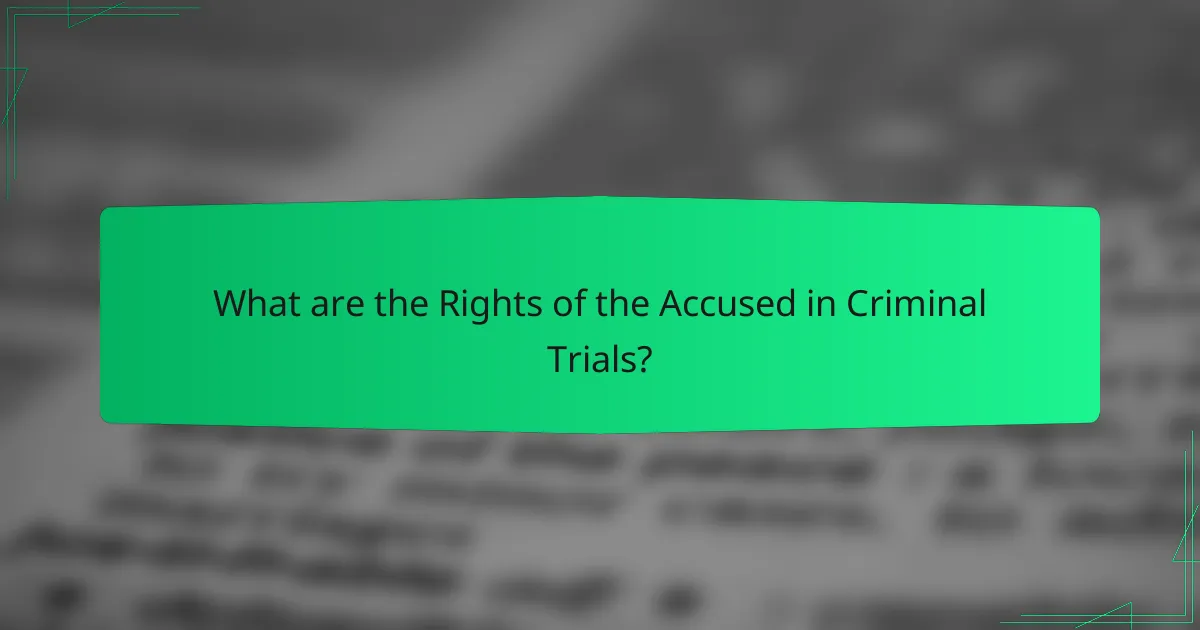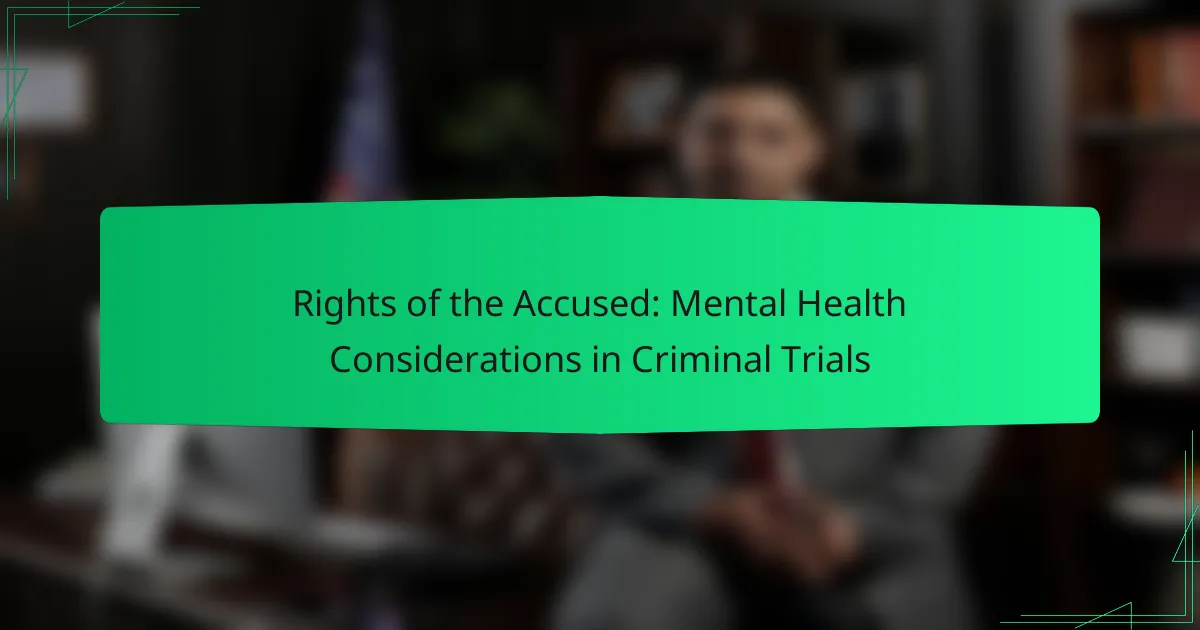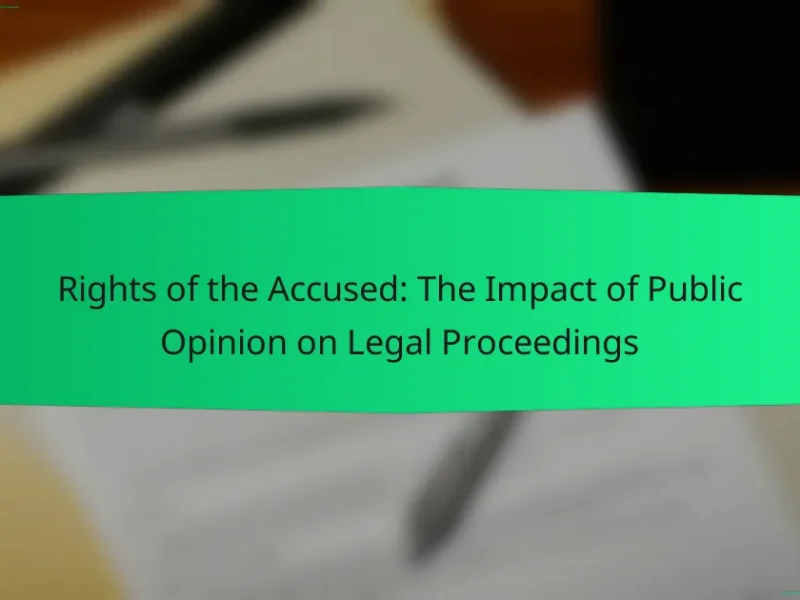The article focuses on the rights of the accused in criminal trials, emphasizing their legal entitlements such as the right to a fair trial, the right to remain silent, and the right to legal counsel. It highlights the Sixth Amendment of the U.S. Constitution, which guarantees a speedy and public trial by an impartial jury, alongside the presumption of innocence. Additionally, it explores the implications of mental health considerations on these rights, addressing how mental health issues can impact the accused’s ability to participate fully in their defense and the overall judicial process. This overview underscores the importance of safeguarding these rights to maintain the integrity and fairness of the legal system.

What are the Rights of the Accused in Criminal Trials?
The rights of the accused in criminal trials include the right to a fair trial, the right to remain silent, and the right to legal counsel. These rights ensure that individuals are treated justly throughout the legal process. The Sixth Amendment of the U.S. Constitution guarantees the right to a speedy and public trial by an impartial jury. Additionally, the accused has the right to confront witnesses and present evidence in their defense. The presumption of innocence is a fundamental principle, meaning the accused is considered innocent until proven guilty. These rights are essential for protecting the integrity of the judicial system and ensuring fair treatment under the law.
How do these rights protect individuals during legal proceedings?
These rights protect individuals during legal proceedings by ensuring fair treatment and safeguarding against unjust outcomes. They guarantee the right to legal representation, allowing individuals to receive proper defense. These rights also include the presumption of innocence, meaning individuals are considered innocent until proven guilty. This principle helps prevent wrongful convictions based on insufficient evidence. Additionally, the right to remain silent protects individuals from self-incrimination. This ensures that individuals cannot be compelled to provide evidence against themselves. Furthermore, access to mental health evaluations can lead to appropriate considerations in sentencing. This can influence the outcome based on the individual’s mental state at the time of the offense. Overall, these rights create a framework that upholds justice and protects individual dignity throughout legal proceedings.
What are the fundamental rights guaranteed to the accused?
The fundamental rights guaranteed to the accused include the right to a fair trial, the right to remain silent, and the right to legal counsel. The right to a fair trial ensures that the accused receives an impartial hearing before a judge or jury. This right is protected under the Sixth Amendment of the U.S. Constitution. The right to remain silent protects individuals from self-incrimination during legal proceedings. This principle is rooted in the Fifth Amendment. The right to legal counsel allows the accused to have an attorney present during questioning and trial. This right is also enshrined in the Sixth Amendment. Additional rights include the presumption of innocence and the right to confront witnesses. These rights collectively safeguard the legal process for individuals facing criminal charges.
How do these rights vary by jurisdiction?
The rights of the accused vary significantly by jurisdiction. Different legal systems provide varying levels of protections and considerations for mental health. For example, some jurisdictions mandate mental health evaluations before trial. Others may not recognize mental health as a mitigating factor during sentencing. Additionally, the standard for competency to stand trial differs across regions. In some areas, a defendant must only understand the charges, while others require a deeper comprehension of the legal process. Furthermore, the availability of mental health resources can influence how rights are upheld. Jurisdictions with robust mental health services may offer more comprehensive support for accused individuals. This disparity can affect trial outcomes and the overall treatment of defendants with mental health issues.
Why are Mental Health Considerations Important for the Accused?
Mental health considerations are crucial for the accused to ensure fair legal proceedings. Mental health can significantly impact a person’s ability to understand charges and participate in their defense. Courts must assess mental competency to stand trial, as individuals with severe mental illness may not grasp legal concepts. This evaluation helps prevent wrongful convictions and ensures that justice is served appropriately. Additionally, mental health issues can influence sentencing and rehabilitation options. Studies show that addressing mental health can lead to better outcomes for both the accused and the criminal justice system. For instance, the National Institute of Mental Health emphasizes the importance of mental health assessments in legal contexts.
How does mental health impact the accused’s ability to stand trial?
Mental health significantly impacts the accused’s ability to stand trial. An individual must be competent to understand the charges and participate in their defense. Mental health conditions can impair cognitive functions, affecting comprehension and communication. Courts assess competency through evaluations by mental health professionals. If found incompetent, the trial may be delayed or dismissed. Research indicates that approximately 15% of defendants are found incompetent to stand trial due to mental illness. This underscores the importance of mental health in legal proceedings.
What legal precedents exist regarding mental health and the rights of the accused?
Legal precedents regarding mental health and the rights of the accused include the landmark case of Dusky v. United States. This 1960 Supreme Court decision established the standard for competency to stand trial. The ruling emphasized that defendants must have a rational and factual understanding of the proceedings against them. Another significant case is Ford v. Wainwright, decided in 1986. This case ruled that it is unconstitutional to execute a person who is insane at the time of execution. Additionally, the case of Medina v. California in 1992 highlighted the state’s right to impose a burden of proof on defendants claiming incompetency. These cases collectively shape the legal framework surrounding mental health considerations in criminal trials.
What Role Does Mental Health Play in Criminal Defense?
Mental health plays a crucial role in criminal defense by influencing the legal standards for competency and insanity. Defendants may claim they were not mentally competent at the time of the offense. This can lead to a verdict of not guilty by reason of insanity, which requires proof of severe mental illness. Mental health evaluations are essential in these cases to assess the defendant’s state of mind. Courts often rely on expert testimony from psychologists or psychiatrists. Studies show that mental health issues are prevalent among criminal defendants, with estimates suggesting up to 20% have serious mental illnesses. This context underscores the importance of mental health in ensuring fair trials and just outcomes.
How can mental health evaluations influence trial outcomes?
Mental health evaluations can significantly influence trial outcomes by assessing a defendant’s competency to stand trial. These evaluations determine if the individual understands the charges and can assist in their defense. If found incompetent, the trial may be delayed or dismissed. Additionally, mental health evaluations can provide insights into a defendant’s state of mind during the crime. This information can affect the jury’s perception and potential sentencing. Research indicates that defendants with diagnosed mental illnesses often receive more lenient sentences. For instance, a study published in the Journal of Forensic Psychology found that jurors are more likely to empathize with defendants who have mental health issues. Thus, mental health evaluations play a crucial role in shaping the legal process and outcomes.
What defenses are available for individuals with mental health issues?
Defenses available for individuals with mental health issues include the insanity defense, diminished capacity, and competency to stand trial. The insanity defense claims that a defendant was unable to understand the nature of their actions due to mental illness. Diminished capacity allows for a reduction in culpability based on mental health conditions affecting judgment. Competency to stand trial assesses whether a defendant can understand court proceedings and assist in their defense. These defenses are grounded in legal standards that consider mental health’s impact on behavior. For instance, the American Psychiatric Association outlines criteria for insanity in the DSM-5. Legal cases, such as the case of John Hinckley Jr., demonstrate the application of the insanity defense in court.
How are Mental Health Issues Addressed in the Legal System?
Mental health issues are addressed in the legal system through various mechanisms. Defendants may be evaluated for competency to stand trial. This evaluation assesses their mental state and ability to understand legal proceedings. If found incompetent, they may receive treatment until they can participate in their trial.
Additionally, mental health can influence sentencing. Courts may consider a defendant’s mental health history when determining penalties. In some cases, individuals may be diverted to mental health treatment instead of incarceration.
The legal system also recognizes insanity defenses. Defendants can argue they were unable to understand the nature of their actions due to mental illness. This can lead to different legal outcomes, such as commitment to a psychiatric facility.
Overall, mental health considerations are integrated into legal processes to ensure fair treatment of individuals with mental health issues.
What procedures are in place for assessing mental competency?
Procedures for assessing mental competency include clinical evaluations, psychological testing, and legal standards. Clinicians conduct comprehensive assessments to determine an individual’s mental state. Standardized tests may evaluate cognitive abilities and mental disorders. Legal standards often reference the Dusky v. United States case, which established criteria for competency. These criteria include the ability to understand court proceedings and assist in one’s defense. Mental health professionals provide written reports to the court. The court may also appoint an independent evaluator for an objective assessment. These procedures ensure that defendants are competent to stand trial.
How does the court accommodate the needs of mentally ill defendants?
The court accommodates the needs of mentally ill defendants by ensuring access to mental health evaluations and treatment. Courts may order psychological assessments to determine a defendant’s competency to stand trial. If found incompetent, the court can mandate treatment until competency is restored. Additionally, courts may allow for alternative sentencing options, such as mental health programs. Special accommodations during trial proceedings can include modified courtroom procedures. These adjustments aim to support the defendant’s understanding of the legal process. The Americans with Disabilities Act also mandates reasonable accommodations for individuals with mental health issues. This legal framework ensures that defendants receive fair treatment throughout the judicial process.
What Challenges Do Accused Individuals with Mental Health Issues Face?
Accused individuals with mental health issues face significant challenges in the legal system. These challenges include difficulties in understanding legal proceedings. Mental health conditions can impair cognitive functions, affecting comprehension and decision-making. Additionally, stigma surrounding mental illness can lead to bias from jurors and legal professionals. This bias may influence the perceived credibility of the accused.
Furthermore, individuals may struggle to access appropriate mental health resources during trial preparation. Inadequate legal representation can exacerbate these issues, as attorneys may lack training in mental health advocacy. According to the National Alliance on Mental Illness, mentally ill defendants are more likely to be incarcerated than receive treatment. This statistic highlights systemic failures in addressing their needs within the criminal justice system. Overall, these challenges create barriers to fair trial rights for accused individuals with mental health issues.
How can stigma affect the treatment of the accused in court?
Stigma can significantly impact the treatment of the accused in court. It may lead to biased perceptions from jurors, judges, and legal professionals. This bias can result in harsher judgments or sentences. Research shows that individuals with mental health issues face discrimination in legal settings. For example, a study published in the journal “Psychiatry, Psychology and Law” found that jurors often hold negative stereotypes about defendants with mental health conditions. Such stigma can diminish the accused’s chances of receiving a fair trial. Furthermore, stigma may affect the accused’s mental well-being, making it harder for them to participate effectively in their defense. Overall, stigma complicates the pursuit of justice for the accused in court.
What barriers exist in accessing mental health resources during trials?
Barriers to accessing mental health resources during trials include stigma, lack of awareness, and resource availability. Stigma surrounding mental health can lead to reluctance in seeking help. Many individuals may not recognize the importance of mental health support. Limited availability of mental health professionals can hinder access to necessary services. Additionally, logistical challenges, such as transportation and scheduling, can further complicate access. Financial constraints may also prevent individuals from obtaining mental health resources. According to a study by the National Institute of Mental Health, these barriers significantly impact the mental well-being of defendants during trials.
What Best Practices Should Legal Professionals Follow Regarding Mental Health?
Legal professionals should prioritize mental health by implementing regular self-care practices. They must recognize the signs of stress and burnout in themselves and their colleagues. Establishing a support network is crucial for sharing experiences and coping strategies. Legal professionals should seek professional help when needed, including therapy or counseling. They should also advocate for mental health resources within their firms or organizations. Training on mental health awareness can enhance understanding and reduce stigma. Additionally, maintaining a healthy work-life balance is essential for overall mental well-being. These practices contribute to a healthier legal environment and better outcomes for clients.
How can attorneys effectively advocate for clients with mental health concerns?
Attorneys can effectively advocate for clients with mental health concerns by understanding their clients’ specific mental health conditions. This understanding allows attorneys to tailor their defense strategies accordingly. They should gather comprehensive mental health evaluations from qualified professionals. These evaluations provide critical insights into the client’s state of mind.
Attorneys must also educate themselves about relevant mental health laws and rights. Familiarity with these laws helps in navigating the legal system effectively. They can present evidence of mental health issues during trials, influencing jury perceptions.
Additionally, attorneys should collaborate with mental health professionals throughout the legal process. This collaboration can enhance the quality of the defense and ensure that the client’s needs are met. Engaging in open communication with clients is crucial. This ensures that clients feel supported and understood during their legal proceedings.
Research indicates that effective advocacy can lead to more favorable outcomes for clients with mental health issues. For instance, a study published in the “American Journal of Psychiatry” shows that defendants with mental health evaluations receive more lenient sentences. This highlights the importance of proper representation in legal matters involving mental health.
What resources are available to support the mental health of the accused?
Mental health resources for the accused include legal aid, counseling services, and support groups. Legal aid provides access to attorneys who understand mental health issues. Counseling services offer therapy and psychological support tailored to the needs of the accused. Support groups create a community for sharing experiences and coping strategies. Additionally, mental health professionals can conduct evaluations to inform the court about the accused’s mental state. These resources aim to ensure that the accused receive appropriate care and support during legal proceedings.
What Future Directions Are Needed for Enhancing Rights of the Accused?
Future directions for enhancing the rights of the accused include increasing access to mental health evaluations. Mental health assessments can ensure that defendants receive appropriate treatment and support. Implementing mandatory mental health training for legal professionals is crucial. This training can improve understanding of mental health issues in the courtroom. Expanding diversion programs for individuals with mental health conditions is also necessary. These programs can reduce incarceration rates and promote rehabilitation. Additionally, improving legal representation for the accused can enhance their rights. Access to competent legal counsel is essential for fair trials. Lastly, advocating for policy reforms that prioritize mental health considerations can create a more just legal system.
How can legal reforms improve the treatment of mentally ill defendants?
Legal reforms can improve the treatment of mentally ill defendants by ensuring appropriate mental health evaluations and access to treatment. These reforms can mandate that courts assess a defendant’s mental competency before proceeding with trials. They can also provide for diversion programs that redirect mentally ill individuals to mental health services instead of traditional incarceration. Research shows that such programs can reduce recidivism rates and improve outcomes for defendants with mental health issues. Additionally, legal reforms can establish clearer guidelines for sentencing, focusing on rehabilitation rather than punishment. This approach recognizes that mental illness can significantly impact behavior and decision-making. By prioritizing mental health care within the legal system, reforms can promote fairer treatment and improve public safety.
What role do advocacy groups play in shaping policies related to mental health in criminal trials?
Advocacy groups play a crucial role in shaping policies related to mental health in criminal trials. They raise awareness about the intersection of mental health and criminal justice. These groups often lobby for legislative changes that protect the rights of individuals with mental health issues. They provide resources and support for defendants, ensuring they receive appropriate evaluations and treatment. Advocacy groups also engage in public education campaigns to inform the community about mental health issues. Studies show that jurisdictions with active advocacy groups tend to have more progressive policies. For example, they may influence the implementation of mental health courts. Such courts focus on rehabilitation rather than punishment for offenders with mental health conditions.
The main entity of this article is the rights of the accused in criminal trials, with a specific focus on mental health considerations. The article outlines fundamental rights such as the right to a fair trial, the right to remain silent, and the right to legal counsel, emphasizing their importance in ensuring justice and fair treatment. It discusses how mental health impacts competency to stand trial and the various defenses available for individuals with mental health issues. Additionally, the article highlights the challenges faced by accused individuals with mental health conditions, the role of legal professionals in advocating for these clients, and the need for reforms to enhance their rights within the legal system.


